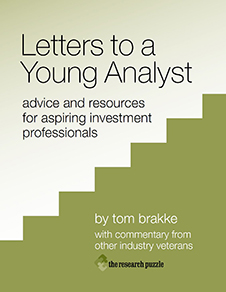
- Tuesday, March 10th, 2009
- a morality play
-
We have reached the end of our long journey into incentives,the research puzzle | The penultimate piece was “one hand clapping” in light of analysts who don’t analyze. and pause to consider the just, the right, and the good. “Greed is good,” a celluloid fellow famously declared, and the debate rages on today as to whether it is or not.
Rich Karlgaard, the publisher of the “capitalist tool” known as Forbes, summed up the recent interlocked financial and economic crises as “a failure of morality, not capitalism.”Forbes | The sentence following that one yearns for “the old Adam Smith/Benjamin Franklin idea of free enterprise.” Thus the conundrum: Where to draw the line on the good greed (self-interest that in aggregate is productive and even virtuous) versus the bad greed (one of the seven deadly sins)? The answer is unknown to all of us, although the placement of that line by an editorialist invariably falls in a predictable place depending on the publication.
Gratefully, such an exercise is “above my pay grade,” as they say, but a provocative essay by Lawrence Mitchell provides a worthwhile way to frame the issues. Titled “The Morals of the Marketplace,”SSRN | And subtitled, “A Cautionary Essay for our Time.” the paper features a wealth of catchy phrases and an interesting thesis about how, as the abstract says, we have honed a market structure in which “finance finances finance rather than production.” Have our own capitalist tools become ones of destruction rather than construction?
Mitchell tracks the development of portfolio theory from Graham and Dodd, when there was a clear link between investment and the so-called real economy, through Markowitz, Sharpe, et al., and the resulting focus on portfolio activity as a recipe of risk and return. As an observer of investment organizations and decision makers, I think his exposition is a little too black and white in some respects, but the arrow hits the target with his examination of the structural disconnects resulting from the “[detachment] of stock from the corporation”SSRN | As one tidbit of evidence, Mitchell cites this seminal piece of research from Graham, Harvey, and Ragjopal, which documents the misaligned incentives that I wrote about in “optioned out.” and the securitization of mortgages.
While standing on different philosophical ground (as is evident from the epilogue to his essay), Mitchell ends up looking in the same direction as Karlgaard: The tailoring of exposures from the “modernization” of finance has resulted in the fragmentation and dispersal of responsibility, to the detriment of our economic system (and, in response, our belief in free markets). It is a lack of responsibility — of morality, if you will — that has characterized this period of economic history.
We have seen the creation of an alphabet soup of investment vehicles that have proven poisonous and the marketing of basic investment products in ways that have misled and harmed clients, largely because of incentives that promote (to use an agricultural analogy in this back-to-basics time) the abuse of the land to maximize this year’s crop instead of the nurturing of it for years of productive activity. The leaders of investment firms have, like the leaders of companies in general, avoided the responsibilities they have as powerful actors in the economic play — to make the hard and, yes, moral decisions that are theirs to make. They should start by dismantling the destructive incentive structures that have contributed to the decimation we have witnessed.
As it is, we are left to the work of the regulatory authorities, and having collectively abdicated our roles in the economic play, we get what we deserve. There are many areas that genuinely need tighter regulation, and some of the strictures put in place will doubtless go too far, proving counterproductive and ripe for removal in some far-off year. Thus is the market for ideas.
The defeat was self-inflicted. The battle was lost by the warriors and their leaders, who too often fought only for the plunder, instead of for the purpose they espoused. Capitalism without responsibility is unsustainable.
